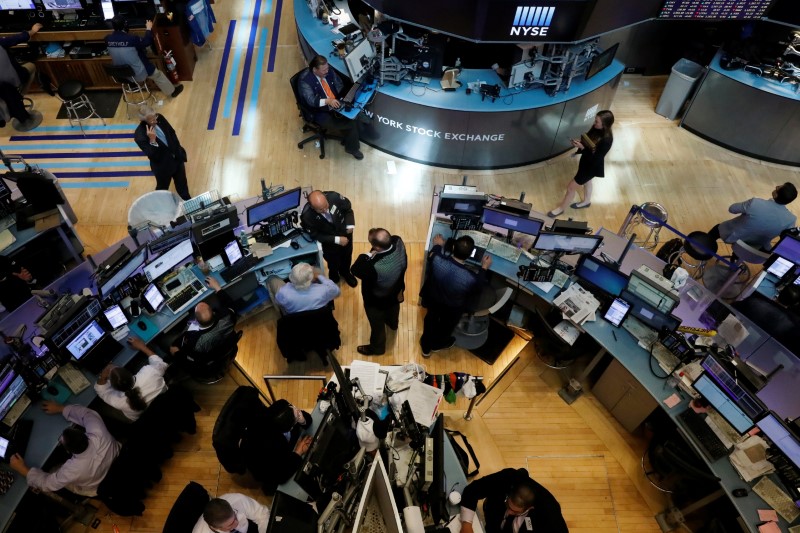By Geoffrey Smith
Investing.com -- The dollar drifts and bond yields move higher at the start of a big week for central banks. A drop in German GDP in the fourth quarter makes the ECB's job harder. Stocks are opening the week lower on recession and interest rate fears. The rout in the stocks and bonds issued by Adani Group companies continues, Nissan and Renault rebalance their alliance, oil is rising despite signs of speculative demand, and U.S. supply slowing. Here's what you need to know in financial markets on Monday, 30th January.
1. Curtain-up on Central Bank week
U.S. bond yields rose but the dollar still weakened at the start of a week in which the Federal Reserve, the European Central Bank, and the Bank of England are all set to raise interest rates again.
Markets expect a 25 basis point hike from the Federal Reserve on Wednesday and 50 basis points each from the ECB and BOE on Thursday. While all of those moves appear relatively certain, there is more uncertainty over the rate paths for the three over the rest of the year – with markets currently predicting a more dovish policy course for all three than their own guidance suggests.
The ECB's task of balancing the risks of recession and inflation was made harder earlier, as German GDP for the fourth quarter was announced to have fallen 0.2%, compared to the stagnation that was expected. However, a re-weighting of Spain's consumer price basket saw headline inflation there accelerate. The euro rose 0.3% to $1.0899.
2. Adani fails to reassure
The rout in stocks and bonds tied to the empire of Gautam Adani gathered pace, as a 400-page rebuttal of the accusations made last week by short-seller Hindenburg Research failed to convince a growing band of skeptics.
Shares in Adani Transmission (NS:ADAI), Adani Total Gas (NS:ADAG), and Adani Green Energy (NS:ADNA) were all suspended and limited down, in Mumbai, bringing the cumulative decline in Adani's portfolio companies to around $70 billion in less than a week. That was despite a modest recovery in the flagship Adani Enterprises (NS:ADEL) holding company, which rose 4.8% after falling over 20% last week.
Adani Enterprises is currently trying to raise $2.4B in new stock, through the sale of 45M new shares. The group is plowing on with the deal, despite having firm bids for fewer than 1M shares as of the close in Mumbai. Abu Dhabi's IHC (ADX:IHC) indicated it would invest in the capital raise as planned.
3. Stocks set to open lower on recession fears, rate caution
U.S. stock markets are set to open lower later, weighed down by recession fears and by the awareness that the market may be taking too positive a view of rate expectations into the Fed meeting.
JPMorgan analysts told clients in a weekend note that they expect chair Jerome Powell's tone to be "hawkish, stressing that a downshifting to a 25bp hike doesn't mean a pause is coming."
By 06:30 ET (11:30 GMT), Dow Jones futures were down 267 points or 0.8%, while S&P 500 futures were down 1.1%, and Nasdaq 100 futures were down 1.5%, largely unwinding the gains that they made last week after a mixed bag of fourth quarter results.
Stocks likely to be in focus later GE HealthCare (NASDAQ:GEHC), which reported earnings early, and ADRs of Philips (NYSE:PHG), which signaled a light at the end of the tunnel for the problems with its sleep apnea products.
4. Nissan, Renault rebalance their alliance
Also likely to be in focus are Nissan ADRs (OTC:NSANY), after the Japanese carmaker announced a rebalancing of its alliance with Renault (EPA:RENA), the result of a years-long power struggle between the two that featured the arrest and flight of former Renault CEO Carlos Ghosn.
Under the deal hammered out by the two, Renault will cut its stake in Nissan to 15% from 43%, bringing it in line with Nissan's stake in Renault, and signaling a more even partnership between the two.
Renault will transfer the other 28.4% of its holding to a trust which will not enjoy voting rights in a broad range of issues. The companies hope the deal will allow them to focus on meeting the challenge from Tesla (NASDAQ:TSLA) and Chinese electric car makers.
5. Oil flat as U.S. rig count drops
Crude oil prices started the week in muted fashion, having sunk back below $80 a barrel over the weekend in line with other risk assets.
By 06:45 ET, U.S. crude futures were flat at $79.69 a barrel, while Brent crude was up 0.1% at $86.47 a barrel.
Data out of the U.S. on Friday painted a relatively bullish picture, with speculative long interest in crude futures hitting its highest since late November, while Baker Hughes' rig count showed the pace of U.S. drilling slowing down in response to the drop in prices at the end of last year. The number of active rigs fell to 609 from as high as 627 in November.
